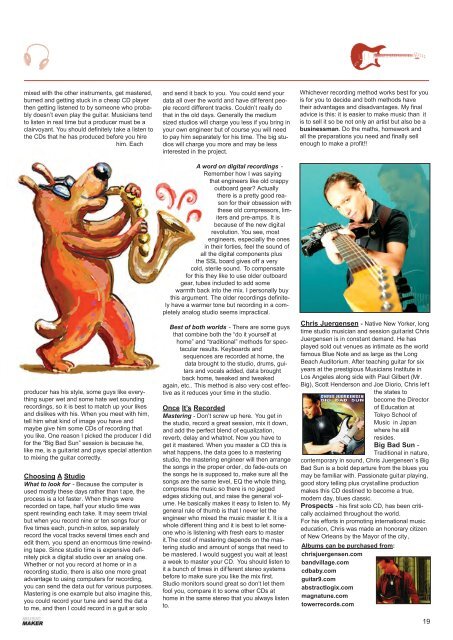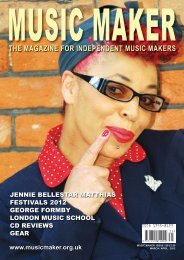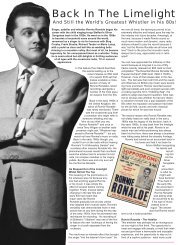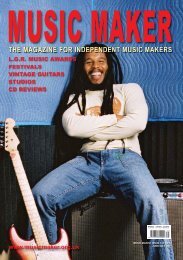the magazine for independent music makers - The Music Maker Guide
the magazine for independent music makers - The Music Maker Guide
the magazine for independent music makers - The Music Maker Guide
You also want an ePaper? Increase the reach of your titles
YUMPU automatically turns print PDFs into web optimized ePapers that Google loves.
mixed with <strong>the</strong> o<strong>the</strong>r instruments, get mastered,<br />
burned and getting stuck in a cheap CD player<br />
<strong>the</strong>n getting listened to by someone who probably<br />
doesn’t even play <strong>the</strong> guitar. <strong>Music</strong>ians tend<br />
to listen in real time but a producer must be a<br />
clairvoyant. You should definitely take a listen to<br />
<strong>the</strong> CDs that he has produced be<strong>for</strong>e you hire<br />
him. Each<br />
producer has his style, some guys like everything<br />
super wet and some hate wet sounding<br />
recordings, so it is best to match up your likes<br />
and dislikes with his. When you meet with him,<br />
tell him what kind of image you have and<br />
maybe give him some CDs of recording that<br />
you like. One reason I picked <strong>the</strong> producer I did<br />
<strong>for</strong> <strong>the</strong> “Big Bad Sun” session is because he,<br />
like me, is a guitarist and pays special attention<br />
to mixing <strong>the</strong> guitar correctly.<br />
Choosing A Studio<br />
What to look <strong>for</strong> - Because <strong>the</strong> computer is<br />
used mostly <strong>the</strong>se days ra<strong>the</strong>r than t ape, <strong>the</strong><br />
process is a lot faster. When things were<br />
recorded on tape, half your studio time was<br />
spent rewinding each take. It may seem trivial<br />
but when you record nine or ten songs four or<br />
five times each, punch-in solos, separately<br />
record <strong>the</strong> vocal tracks several times each and<br />
edit <strong>the</strong>m, you spend an enormous time rewinding<br />
tape. Since studio time is expensive definitely<br />
pick a digital studio over an analog one.<br />
Whe<strong>the</strong>r or not you record at home or in a<br />
recording studio, <strong>the</strong>re is also one more great<br />
advantage to using computers <strong>for</strong> recording,<br />
you can send <strong>the</strong> data out <strong>for</strong> various purposes.<br />
Mastering is one example but also imagine this,<br />
you could record your tune and send <strong>the</strong> dat a<br />
to me, and <strong>the</strong>n I could record in a guit ar solo<br />
MUSIC<br />
MAKER<br />
and send it back to you. You could send your<br />
data all over <strong>the</strong> world and have dif ferent people<br />
record different tracks. Couldn’t really do<br />
that in <strong>the</strong> old days. Generally <strong>the</strong> medium<br />
sized studios will charge you less if you bring in<br />
your own engineer but of course you will need<br />
to pay him separately <strong>for</strong> his time. <strong>The</strong> big studios<br />
will charge you more and may be less<br />
interested in <strong>the</strong> project.<br />
A word on digital recordings -<br />
Remember how I was saying<br />
that engineers like old crappy<br />
outboard gear? Actually<br />
<strong>the</strong>re is a pretty good reason<br />
<strong>for</strong> <strong>the</strong>ir obsession with<br />
<strong>the</strong>se old compressors, limiters<br />
and pre-amps. It is<br />
because of <strong>the</strong> new digital<br />
revolution. You see, most<br />
engineers, especially <strong>the</strong> ones<br />
in <strong>the</strong>ir <strong>for</strong>ties, feel <strong>the</strong> sound of<br />
all <strong>the</strong> digital components plus<br />
<strong>the</strong> SSL board gives off a very<br />
cold, sterile sound. To compensate<br />
<strong>for</strong> this <strong>the</strong>y like to use older outboard<br />
gear, tubes included to add some<br />
warmth back into <strong>the</strong> mix. I personally buy<br />
this argument. <strong>The</strong> older recordings definitely<br />
have a warmer tone but recording in a completely<br />
analog studio seems impractical.<br />
Best of both worlds - <strong>The</strong>re are some guys<br />
that combine both <strong>the</strong> “do it yourself at<br />
home” and “traditional” methods <strong>for</strong> spectacular<br />
results. Keyboards and<br />
sequences are recorded at home, <strong>the</strong><br />
data brought to <strong>the</strong> studio, drums, guitars<br />
and vocals added, data brought<br />
back home, tweaked and tweaked<br />
again, etc.. This method is also very cost ef fective<br />
as it reduces your time in <strong>the</strong> studio.<br />
Once It’s Recorded<br />
Mastering - Don’t screw up here. You get in<br />
<strong>the</strong> studio, record a great session, mix it down,<br />
and add <strong>the</strong> perfect blend of equalization,<br />
reverb, delay and whatnot. Now you have to<br />
get it mastered. When you master a CD this is<br />
what happens, <strong>the</strong> data goes to a mastering<br />
studio, <strong>the</strong> mastering engineer will <strong>the</strong>n arrange<br />
<strong>the</strong> songs in <strong>the</strong> proper order, do fade-outs on<br />
<strong>the</strong> songs he is supposed to, make sure all <strong>the</strong><br />
songs are <strong>the</strong> same level, EQ <strong>the</strong> whole thing,<br />
compress <strong>the</strong> <strong>music</strong> so <strong>the</strong>re is no jagged<br />
edges sticking out, and raise <strong>the</strong> general volume.<br />
He basically makes it easy to listen to. My<br />
general rule of thumb is that I never let <strong>the</strong><br />
engineer who mixed <strong>the</strong> <strong>music</strong> master it. It is a<br />
whole different thing and it is best to let someone<br />
who is listening with fresh ears to master<br />
it.<strong>The</strong> cost of mastering depends on <strong>the</strong> mastering<br />
studio and amount of songs that need to<br />
be mastered. I would suggest you wait at least<br />
a week to master your CD. You should listen to<br />
it a bunch of times in dif ferent stereo systems<br />
be<strong>for</strong>e to make sure you like <strong>the</strong> mix first.<br />
Studio monitors sound great so don’t let <strong>the</strong>m<br />
fool you, compare it to some o<strong>the</strong>r CDs at<br />
home in <strong>the</strong> same stereo that you always listen<br />
to.<br />
Whichever recording method works best <strong>for</strong> you<br />
is <strong>for</strong> you to decide and both methods have<br />
<strong>the</strong>ir advantages and disadvantages. My final<br />
advice is this: it is easier to make <strong>music</strong> than it<br />
is to sell it so be not only an artist but also be a<br />
businessman. Do <strong>the</strong> maths, homework and<br />
all <strong>the</strong> preparations you need and finally sell<br />
enough to make a profit!!<br />
Chris Juergensen - Native New Yorker, long<br />
time studio <strong>music</strong>ian and session guitarist Chris<br />
Juergensen is in constant demand. He has<br />
played sold out venues as intimate as <strong>the</strong> world<br />
famous Blue Note and as large as <strong>the</strong> Long<br />
Beach Auditorium. After teaching guitar <strong>for</strong> six<br />
years at <strong>the</strong> prestigious <strong>Music</strong>ians Institute in<br />
Los Angeles along side with Paul Gilbert (Mr.<br />
Big), Scott Henderson and Joe Diorio, Chris lef t<br />
<strong>the</strong> states to<br />
become <strong>the</strong> Director<br />
of Education at<br />
Tokyo School of<br />
<strong>Music</strong> in Japan<br />
where he still<br />
resides.<br />
Big Bad Sun -<br />
Traditional in nature,<br />
contemporary in sound, Chris Juergensen’s Big<br />
Bad Sun is a bold departure from <strong>the</strong> blues you<br />
may be familiar with. Passionate guitar playing,<br />
good story telling plus crystalline production<br />
makes this CD destined to become a true,<br />
modern day, blues classic.<br />
Prospects - his first solo CD, has been critically<br />
acclaimed throughout <strong>the</strong> world.<br />
For his ef<strong>for</strong>ts in promoting international <strong>music</strong><br />
education, Chris was made an honorary citizen<br />
of New Orleans by <strong>the</strong> Mayor of <strong>the</strong> city ,<br />
Albums can be purchased from:<br />
chrisjuergensen.com<br />
bandvillage.com<br />
cdbaby.com<br />
guitar9.com<br />
abstractlogix.com<br />
magnatune.com<br />
towerrecords.com<br />
19





